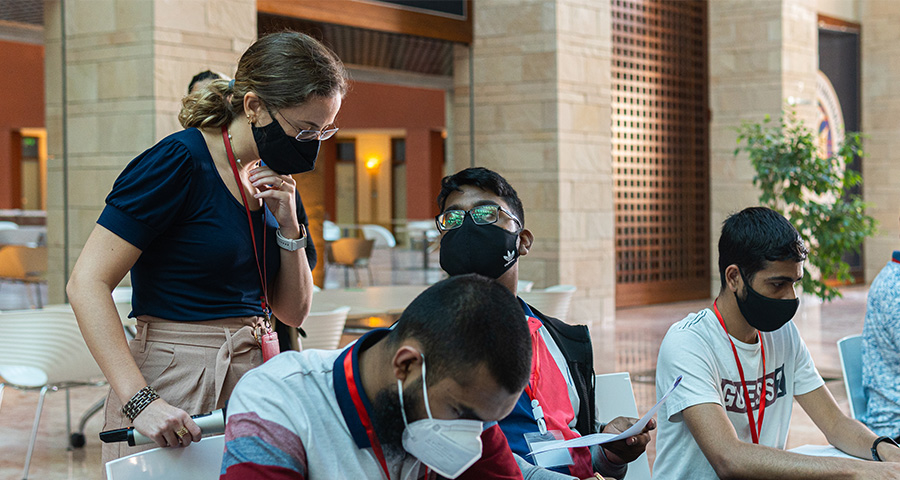
Carnegie Mellon hosts Qatar Collegiate Programming Competition
Teams from three universities advance to the Arab regional competition
Carnegie Mellon University in Qatar (CMU-Q), a Qatar Foundation partner university, hosted the first in-person Qatar Collegiate Programming Competition (QCPC). More than 50 students competed on 18 teams, including students from CMU-Q, Georgetown University in Qatar (GU-Q), Qatar University (QU), and Bright Future International School.
Michael Trick, dean of CMU-Q, said: “We are delighted to welcome students from all over Qatar for a competition that challenges and expands their programming skills. Carnegie Mellon has one of the best computer science programs in the world, and we hope this competition will inspire young programmers in Qatar.”
CMU-Q faculty members Giselle Reis and Eduardo Feo Flushing organized the first QCPC event last year. Due to COVID-19 restrictions, the first national event was online, with only 10 teams participating. This year, they organized a two-day event sponsored by local tech companies Rimads and Snoonu.
“The ICPC is the largest and most prestigious contest of its kind in the world,” said Reis. “Having our own national competition is an opportunity for talented students in Qatar to practice problem-solving and compete on a world stage.”
National ICPC competitions are held around the globe, with the winners advancing to regional competitions, and ultimately the ICPC World Finals. For this competition, students tackled a set of 12 programming problems over five hours.
To prepare participants for the competition, CMU-Q held a practice session the day before the live competition. “I was very impressed by the high school students,” said Reis. “They didn’t know the programming language that we use in the competition, so they spent the night after the practice session to become familiar with it.”
CMU-Q teams did particularly well. The winning team included first-year student Andrey Genze, and juniors Igli Mlloja and Abubakr Mohamed, who successfully completed an impressive 11 out of 12 problems. The second-place team included sophomore students Thang Bui, Andrei-Horia Pacurar, and Ulan Seitkaliyev, who completed 10 problems. The third-place team was made up entirely of first year students: Tasnim Bin Akbar, Azmain Adib Pahlowan and Talhah Peerbhai.
The top two teams from CMU-Q and QU, as well as one team from GU-Q, qualify for the regional competition in Egypt that is scheduled for December.
